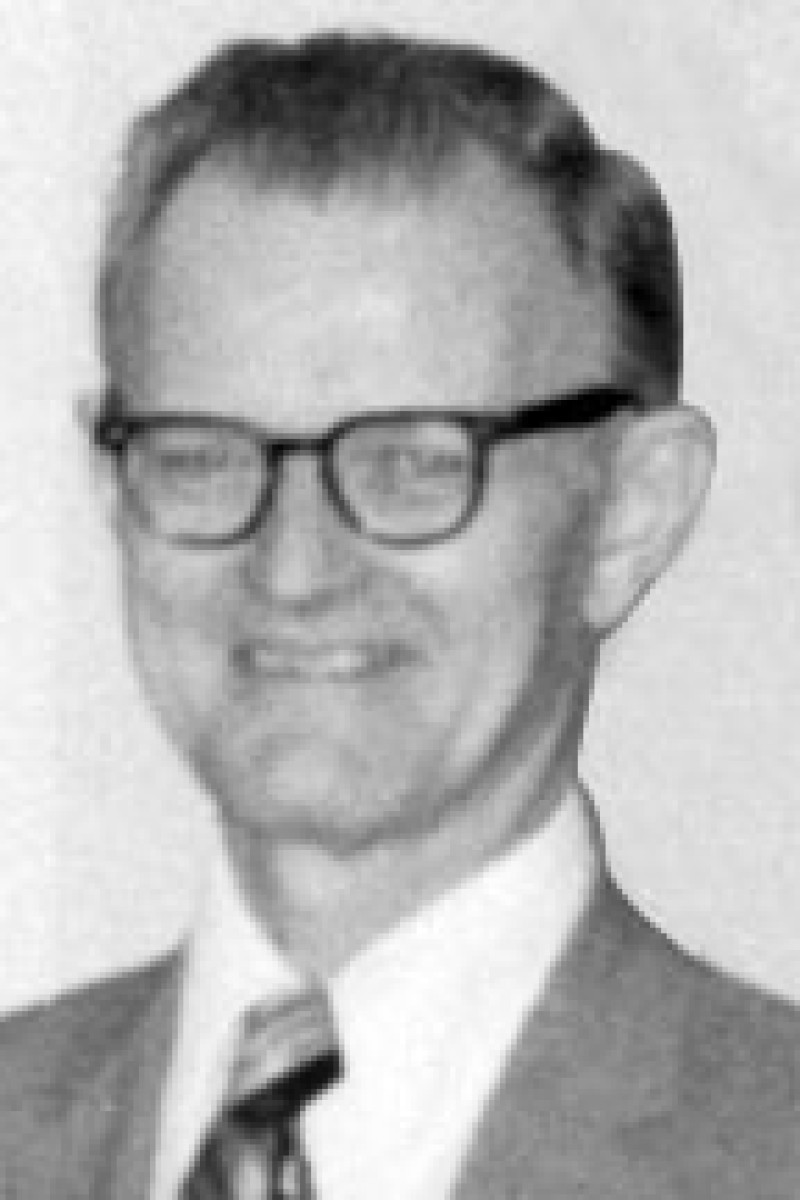Rankin MacDougal Gibson
Rankin MacDougal Gibson said his belief was that “you’re not a specialist when you’re a judge on the Supreme Court, but you are a generalist in Ohio law.”
Gibson was born in Unionville, Mo. on Oct. 9, 1916 to Alexander R. and Murle L. Fletcher Gibson. He attended Northeast Missouri State Teachers College from 1934 to 1936, earned a law degree at the University of Missouri in 1939 and passed the bar that year, as well. He opened a general law practice in Unionville, but in 1940, Gibson took a position as an attorney with the St. Louis insurance firm of T.H. Mastin & Co.
Gibson worked as an attorney for the Veterans Administration in Des Moines, St. Paul and Washington, D.C. from 1945 to 1951. During this time, he continued his education at the St. Paul College of Law, earning a bachelor of science in law in 1948, and at George Washington University, where he earned a master of laws in 1950. That year, he also was admitted to the bar of the U.S. Supreme Court. Gibson joined the National Wage Stabilization Board in 1951, where he worked as an enforcement and litigation attorney.
In 1951, Gibson joined the faculty at the University of Toledo College of Law as an associate professor and taught there until 1956. In 1954, Gibson was admitted to the Ohio bar.
Gibson joined the Toledo law firm of DiSalle, Green, Haddad & Lynch in 1956, where he remained until 1959 when he moved to Columbus to serve as assistant to Gov. Michael DiSalle. Gibson also served from 1959 to 1961 as the Ohio member of the Interstate Cooperation Committee and as chairman of the Governor’s Committee on Public Information. He continued to be involved in legal education, teaching a class in administrative law at Franklin University’s School of Law. From 1961 to 1962, Gibson served as director of the Ohio Department of Commerce and as a member of the Ohio Water Pollution Board, the Civil War Centennial Commission and the Ohio Housing Board. In 1963, he was named to lead the Public Utilities Commission.
Gov. DiSalle appointed Gibson to the Supreme Court of Ohio in 1963, to fill the vacancy left by Kingsley Taft, who became Chief Justice. Gibson had to run in the 1964 election for the unexpired portion of the term and lost to Paul W. Brown. During his brief tenure on the Court, Gibson faced philosophical differences with Chief Justice Taft, who accused him of being a “bleeding heart.” Gibson stated in a 1972 interview, “I generally was for the poor man, the injured man, the working man or the Negro who was involved in the litigation.”
One of the significant cases that went before the court during this time in 1963 was Brown, Weiss and Wohl. This case involved the unauthorized practice of law in Cuyahoga County, particularly in relation to workers’ compensation. Gibson wrote the opinion, but could not get agreement with the other Justices, so it turned out that Chief Justice Taft wrote the majority opinion and Gibson’s opinion became the dissenting one. This case was important for lawyers, unions, actuaries and employees.
In 1972, at his induction as president of the Columbus Bar Association, Gibson was sworn in by then-Chief Justice C. William O’Neill, who remembered Gibson as “one of the Court’s best legal scholars when he was on the Supreme Court bench.”
Gibson returned to private practice in 1965, as a partner with the Columbus firm of Lucas, Predergast, Albright, Gibson & Newman, where he remained, becoming of counsel in 1995. He also taught at Capital Law School from 1967 to 1995.
In 1979, Gibson won a class-action lawsuit for a coalition of nursing homes in Ohio, winning payment of $2 million, the highest fee granted in the history of the Franklin County Court of Common Pleas. The case involved a challenge by the nursing homes of payment for Medicaid patients under a new state law. In 1989, he served as an arbitrator with Arbitration Forums Inc.
Gibson married Eloise M. Corns on Sept. 13, 1941and they had two children. Gibson died on June 4, 2001 in West Jefferson.

b. Oct. 9, 1916
d. June 1, 2001
120th Justice of the Supreme Court of Ohio
TERM
Jan 1, 1963
to Nov 1, 1964
